Play audio — original link
Play audio
Play audio
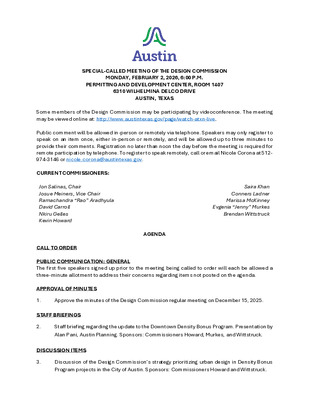
SPECIAL-CALLED MEETING OF THE DESIGN COMMISSION MONDAY, FEBRUARY 2, 2026, 6:00 P.M. PERMITTING AND DEVELOPMENT CENTER, ROOM 1407 6310 WILHELMINA DELCO DRIVE AUSTIN, TEXAS Some members of the Design Commission may be participating by videoconference. The meeting may be viewed online at: http://www.austintexas.gov/page/watch-atxn-live. Public comment will be allowed in-person or remotely via telephone. Speakers may only register to speak on an item once, either in-person or remotely, and will be allowed up to three minutes to provide their comments. Registration no later than noon the day before the meeting is required for remote participation by telephone. To register to speak remotely, call or email Nicole Corona at 512- 974-3146 or nicole.corona@austintexas.gov. CURRENT COMMISSIONERS: Jon Salinas, Chair Josue Meiners, Vice Chair Ramachandra “Rao” Aradhyula David Carroll Nkiru Gelles Kevin Howard CALL TO ORDER AGENDA Saira Khan Conners Ladner Marissa McKinney Evgenia “Jenny” Murkes Brendan Wittstruck PUBLIC COMMUNICATION: GENERAL The first five speakers signed up prior to the meeting being called to order will each be allowed a three-minute allotment to address their concerns regarding items not posted on the agenda. APPROVAL OF MINUTES 1. Approve the minutes of the Design Commission regular meeting on December 15, 2025. STAFF BRIEFINGS 2. Staff briefing regarding the update to the Downtown Density Bonus Program. Presentation by Alan Pani, Austin Planning. Sponsors: Commissioners Howard, Murkes, and Wittstruck. DISCUSSION ITEMS 3. Discussion of the Design Commission’s strategy prioritizing urban design in Density Bonus Program projects in the City of Austin. Sponsors: Commissioners Howard and Wittstruck. DISCUSSION AND ACTION ITEMS 4. 5. 6. Discussion and action to recommend to City Council two-way conversions downtown. Presented by Adam Greenfield, Safe Streets. Sponsors: Commissioners Carroll and Howard. Discussion and action to recommend to City Council whether the project W. Martin Luther King Jr. Boulevard & Nueces Street, located at 601, 607, 611, 619 West Martin Luther King Jr Boulevard, 1809 Rio Grande Street, 1806 Nueces Street, 1801 Rio Grande Street, 604 West 18th Street and 1800 Nueces Street, complies with the Urban Design Guidelines for the City of Austin in accordance with Land Development Code § 25-2-586 (C)(1)(a)(ii). Presented by Leah Bojo, Drenner Group, PC, Justin Short, STG Design, and Chris Jackson, Fable Landscape Architecture. Approve a recommendation to City Council to recognize the Design Commission as an official stakeholder in the Density Bonus Program update process and recommend that the Design Commission and Staff advance council-requested updates to …
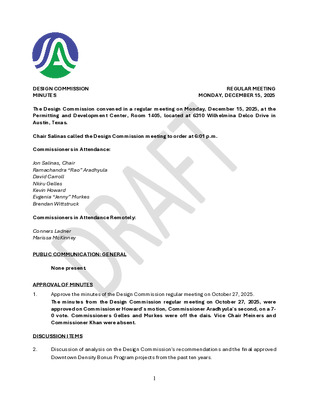
DESIGN COMMISSION MINUTES REGULAR MEETING MONDAY, DECEMBER 15, 2025 The Design Commission convened in a regular meeting on Monday, December 15, 2025, at the Permitting and Development Center, Room 1405, located at 6310 Wilhelmina Delco Drive in Austin, Texas. Chair Salinas called the Design Commission meeting to order at 6:01 p.m. Commissioners in Attendance: Jon Salinas, Chair Ramachandra “Rao” Aradhyula David Carroll Nkiru Gelles Kevin Howard Evgenia “Jenny” Murkes Brendan Wittstruck Commissioners in Attendance Remotely: Conners Ladner Marissa McKinney PUBLIC COMMUNICATION: GENERAL None present. APPROVAL OF MINUTES 1. Approve the minutes of the Design Commission regular meeting on October 27, 2025. The minutes from the Design Commission regular meeting on October 27, 2025, were approved on Commissioner Howard’s motion, Commissioner Aradhyula’s second, on a 7- 0 vote. Commissioners Gelles and Murkes were off the dais. Vice Chair Meiners and Commissioner Khan were absent. DISCUSSION ITEMS 2. Discussion of analysis on the Design Commission's recommendations and the final approved Downtown Density Bonus Program projects from the past ten years. 1 The item was discussed. 3. 4. Discussion of the draft Urban Design Guidelines regarding the sections: Introduction, Core Principle A: Protect Pedestrians and Bicyclists from the Elements, and Core Principle B: Protect Sidewalk and Bikeway Users from Motor Vehicles. The motion to postpone the item indefinitely was approved on Commissioner Howard’s motion, Chair Salinas’ second, on a 9-0 vote. Vice Chair Meiners and Commissioner Khan were absent. Discussion of the timeline and obstacles of the update to the Urban Design Guidelines. Sponsors: Chair Salinas, Vice Chair Meiners, and Commissioner Howard. The item was discussed. DISCUSSION AND ACTION ITEMS 5. 6. Discussion and action to select Downtown Density Bonus Program projects from the past ten years to analyze outcomes. Sponsors: Chair Salinas and Vice Chair Meiners. The motion to postpone the item indefinitely was approved on Commissioner Wittstruck’s motion, Chair Salinas’ second, on a 9-0 vote. Vice Chair Meiners and Commissioner Khan were absent. Discussion and action to select members for the Planning and Urban Design Working Group. Sponsors: Chair Salinas and Commissioner Howard. The motion to assign Commissioner Gelles to the Planning and Urban Design Working Group was approved on Chair Salinas’ motion, Commissioner Howard’s second, on a 9-0 vote. Vice Chair Meiners and Commissioner Khan were absent. COMMITTEE UPDATES 7. 8. Update from the representative of the Downtown Commission regarding the meeting on November 19, 2025. The update was given …
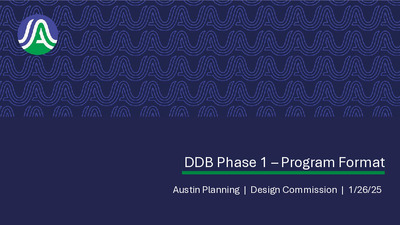
DDB Phase 1 – Program Format Austin Planning | Design Commission | 1/26/25 DDB Phase 1 Current Downtown Density Bonus Program Base Entitlements Sites have height and FAR limits set by their base zoning (e.g., CBD = 350ft of height & 8:1 FAR*) Participating in DDB Sites must meet gatekeeper requirements + community benefits in exchange for additional entitlements (i.e., height & FAR) Height & FAR Map Existing height & FAR map indicates additional height and FAR limits that can be achieved within each subdistrict Exceeding Height & FAR Map Sites can request Council approval to exceed allowed height and FAR limits *FAR limits do not apply to residential or mixed-use projects meeting SB840 standards 3 4 5 Proposed Amendment Approach Phase I: Create new zoning combining district(s) that include updated program requirements and regulations for Downtown Density Bonus Rezone Phase I geography into the new combining district through area-wide rezoning Phase II: Refine regulations, create additional combining districts as needed, and rezone the remainder of geography into the new combining districts Moving forward: Property owners would be able to request rezoning into higher intensity combining districts 6 Downtown Density Bonus Program – Phase 1 Create New Combining Districts (-DDB or similar) Every property within a combining district gets the same height in exchange for the same affordable housing (e.g., combining district 1 provides +100ft in exchange for 5% affordable units (or fee-in-lieu) while combining district 2 provides +400ft in exchange for 7% affordable units (or fee-in-lieu) ) Additional height is additive to the property’s base zoning height limit Define New Core Subdistrict in the Land Development Code Properties within subdistrict are eligible to rezone to the DDB Combining Districts Gatekeeper requirements or community benefits menu could be customized for each subdistrict Rezone properties within Core Subdistrict to new DDB Combining District Properties can add a fixed amount of height above their base height in exchange for participation in the DDB program If properties desire additional height, they can request rezoning into higher intensity combining districts 7 Program Heights Max. Height (?? ft) Height (?? ft) Base Height (350 ft) CBD by-right entitlements today Entitlements after DDB update and city-initiated rezoning Future max. entitlements to be requested via rezoning 8 Downtown Heights Current CBD Base Height …
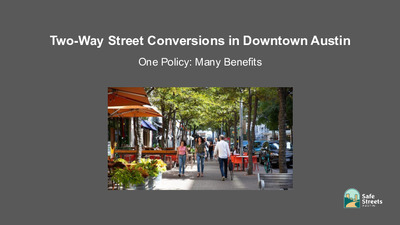
Two-Way Street Conversions in Downtown Austin One Policy: Many Benefits 49% Fewer crashes 23% Less crime 39% Property value rise Two-Way Street Conversion: Evidence of Increased Livability in Louisville KY (Riggs & Gilderbloom (2015), Journal of Planning Education and Research 10-20% Increase in retail sales (Vancouver WA) "One-way streets should not be allowed in prime downtown retail areas. We've proven that." Rebecca Ocken, Executive Director, Vancouver WA Downtown Association “The design has facilitated a better response from police and fire.” “When we experience a problem, we are provided with more options to redirect traffic.” Wm. Todd Bailey, Police Chief, New Albany IN Less Congestion, Shorter Travel Times “Dozens of cities have reconfigured one-way streets into two-way streets as a means of bringing their downtowns to life.” Governing Magazine Two-Way Conversions: One Policy, Many Benefits ● Safer streets ● More walking and bicycling ● Healthier local businesses ● Faster emergency access ● Lower crime ● Higher property values ● Easier navigation and access Addressing Left-Turn Lanes & Transit Reliability ● Left-turn pockets ● Leading left-turn traffic signals ● All-way stops ● Prohibit left turns at certain intersections and/or at certain times Two-Way Conversions: Success Every Time in Austin 1992: First Street / E Cesar Chavez, Second Street (east of I-35) 2008: Cesar Chavez, Second Street 2015: Brazos Street 2017: 5th Street 2018: Colorado Street 2019: 16th, 17th, 18th Street “Sixth Street should be immediately converted to two-way traffic…" Regional/Urban Design Assistance Team (R/UDAT) of the American Institute of Architects (AIA), 1991 “Just do it.” “15 minutes after you make the change [to two-way], people will be asking why you didn’t do it 25 years earlier.” Minneapolis mayor R.T. Rybak (2010)
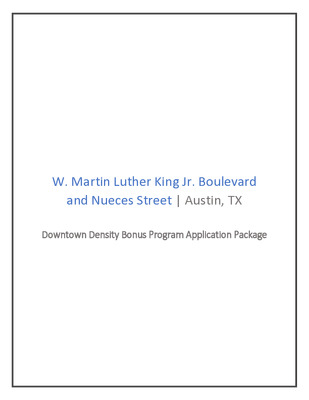
W. Martin Luther King Jr. Boulevard and Nueces Street | Austin, TX Downtown Density Bonus Program Application Package TABLE OF CONTENTS APPLICANT SUMMARY LETTER DOWNTOWN DENSITY BONUS APPLICATION VICINITY PLAN & NEARBY TRANSIT FACILITIES EXHIBIT NEARBY OPEN SPACE EXHIBIT SITE PLAN FLOOR PLANS EXTERIOR ELEVATION PLANS GREAT STREETS PLANS AND EXHIBIT CIRCULATION EXHIBIT DEVELOPMENT BONUS COMMUNITY BENEFITS CALCULATION DESIGN COMMISSION PROJECT REVIEW APPLICATION URBAN DESIGN GUIDELINES MATRIX December 16, 2025 Via Electronic Delivery Ms. Lauren Middleton-Pratt Planning Department City of Austin 1000 E 11th Street Austin, TX 78702 Re: W. Martin Luther King Jr. Boulevard & Nueces Street – Downtown Density Bonus Program (“DDBP”) Application and Summary of Compliance with the City of Austin’s Urban Design Guidelines for a hotel and residential tower project located at 601, 607, 611, 619 W Martin Luther King Jr Blvd, 1809 Rio Grande St and 1806 Nueces St, 1801 Rio Grande Street, 604 W 18th Street and 1800 Nueces Street (the “Property”). Dear Ms. Middleton-Pratt: On behalf of the property owners, The 1806 Group LP, Jack Brown Family II Limited Partnership, Triple Play Properties LTD and Scott Sayers (“Owners”), please accept this letter and supporting documentation as a true and complete submittal application for the Downtown Density Bonus Program (“DDBP”) for the property located on the block bounded by W. Martin Luther King Jr. Boulevard to the north, Rio Grande Street to the west, Nueces Street to the east and W. 18th Street to the south in Austin, Texas. The project consists of a full-block development comprising a 37-story hotel/condominium building and a 34-story residential building, with the existing alley retained between the two structures. The northern building will include 287 hotel keys, 61 residential units and approximately 4,903 SF of pedestrian-oriented uses (retail/restaurant) at the ground floor. The southern building will have 318 residential units and approximately 6,515 SF of retail. The Property is located within the Northwest subdistrict of the Downtown Austin Plan (DAP) and is zoned General Commercial Services (“CS”), General Commercial Services – Mixed Use (“CS- MU”), (“GO”) and (“DMU-CO”). The Property is expected be entitled to a floor-to-area ratio (“FAR”) of 5:1 after rezoning to Downtown Mixed-Use – Conditional Overlay (DMU-CO), via zoning cases C14-2025-0090 and C14-2025-0093 that are currently in review. The eastern half of the Property is located within the DDBP and is eligible to participate in the program up to a maximum of 3:1 FAR. The …
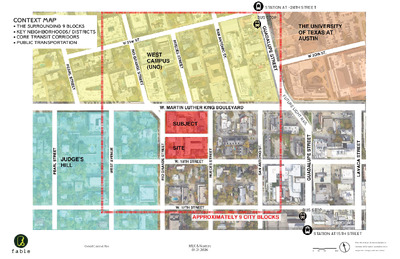
context map • the surrounding 9 blocks • key neighborhoods/ districts • core transit corridors • public transportation STATION AT ~24TH STREET BUS STOP FUTURE LIGHT RAIL Overall Context Plan BUS STOP STATION AT 15TH STREET 0 45’ 90’ 180’ The information shown is based on the best information available and is subject to change without notice.MLK & Nueces01.21.2026 technical site plan • dimensional control for coa great streets • integration of planting ar- eas, vehicular drop-offs, etc. Overall Technical Plan COA Great Streets Compliance 0 10’ 20’ 40’ The information shown is based on the best information available and is subject to change without notice.MLK & Nueces01.21.2026
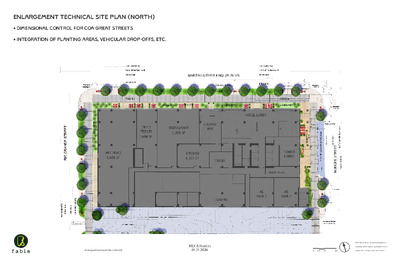
enlargement technical site plan (NORTH) • dimensional control for coa great streets • integration of planting areas, vehicular drop-offs, etc. Enlarged Technical Plan (North) 0 7.5’ 15’ 30’ The information shown is based on the best information available and is subject to change without notice.MLK & Nueces01.21.2026
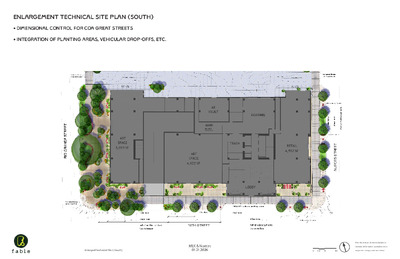
enlargement technical site plan (south) • dimensional control for coa great streets • integration of planting areas, vehicular drop-offs, etc. Enlarged Technical Plan (South) 0 7.5’ 15’ 30’ The information shown is based on the best information available and is subject to change without notice.MLK & Nueces01.21.2026
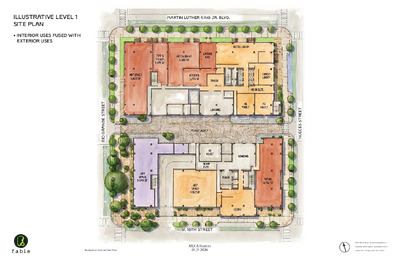
illustrative level 1 site plan • interior uses fused with exterior uses Illustrative Overall Site Plan The information shown is based on the best information available and is subject to change without notice.MLK & Nueces01.21.2026w. 18th StreetNueces streetmartin luther king jr. blvd.rio grande street illustrative level 1 site plan - activated - any day • interior uses fused with exterior uses • exterior spaces activated • landscape lighting would include the following: - AE CObra-head streetlights - gfci outlets at trees for seasonal, festive lighting - southwest park would likely have small, integrat ed bollards in the \ landscape to illuminate - potential festoon / feature lighting in the alley Illustrative Overall Site Plan - Activated The information shown is based on the best information available and is subject to change without notice.MLK & Nueces01.21.2026w. 18th StreetNueces streetmartin luther king jr. blvd.rio grande streetpublic alleyrio grande streetNueces street illustrative level 1 site plan - activated - farmers market in alley • interior uses fused with exterior uses • exterior spaces activated • specialty programming, i.e. farmer’s market • landscape lighting would include the following: - AE CObra-head streetlights - gfci outlets at trees for seasonal, festive lighting - southwest park would likely have small, integrat ed bollards in the landscape to illuminate - potential festoon / feature lighting in the alley Illustrative Overall Site Plan - Activated The information shown is based on the best information available and is subject to change without notice.MLK & Nueces01.21.2026w. 18th StreetNueces streetmartin luther king jr. blvd.rio grande streetpublic alleyrio grande streetNueces street coa and daa history, interest, and focus on alley activation Downtown Austin - Alley Activation! 0 10’ 20’ 40’ The information shown is based on the best information available and is subject to change without notice.MLK & Nueces01.21.2026 conceptual rendering of alley activation - farmer’s market Conceptual Rendering - Activated Alley - Farmer’s Market The information shown is based on the best information available and is subject to change without notice.MLK & Nueces01.21.2026 MLK & Nueces thank you. MARTIN LUTHER KING JR. BLVD. row centerline front of median curb drive lane 4 bike racks, (8 bikes) drive lane 2 benches trashcan streetlight row centerline front of median curb drive lane drive lane RIGHT OF WAY PROPERTY LINE trashcan streetlight 2 benches l planting zone patio zone planting zone a t n e m e p p u s l e n …
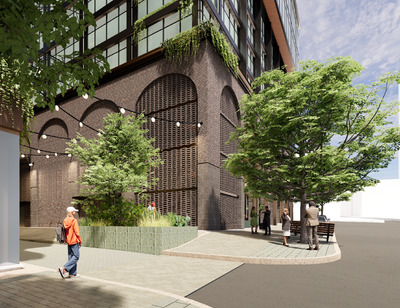
Backup

Backup
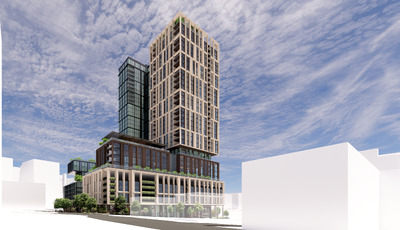
Backup

Backup
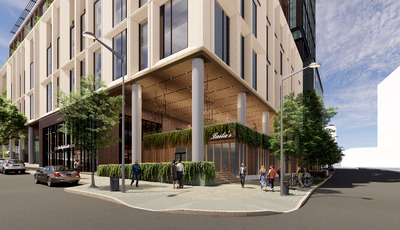
Backup
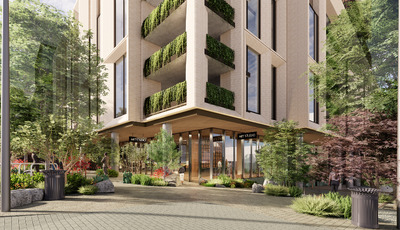
Backup
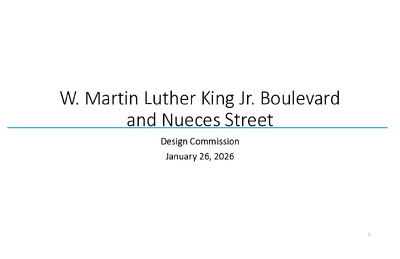
W. Martin Luther King Jr. Boulevard and Nueces Street Design Commission January 26, 2026 1 Neighborhood Context 2 Current Zoning and Use • • Zoning Application #1: • CS (General Commercial Services) and CS-MU (General Commercial Services – Mixed Use) to DMU-CO (Downtown Mixed Use – Conditional Overlay) Zoning Application #2: • GO (General Office) and DMU-CO (Downtown Mixed Use – Conditional Overlay) to DMU-CO (Downtown Mixed Use – Conditional Overlay) • Surrounded by DMU, ETOD, UNO overlay districts • Currently used as retail buildings and multifamily residences 3 Project Compliance 1. Compliance with LDC §25-2-586 (C)(1)(b): Compliance with Great Streets Standards 2. Compliance with LDC §25-2-586 (C)(1)(c): Minimum Austin Energy Green Building 2-Star Rating 3. Compliance with LDC §25-2-586 (C)(1)(a): Substantial Compliance with Urban Design Guidelines 4. Review Community Benefits Calculation Austin Energy Green Building 3-Star Rating Affordable Housing Fee-in-lieu 4 Downtown Density Bonus Location 5 Downtown Density Bonus Location 66 Site & Project Facts Address: Boulevard, Lot Size: 601, 607, 611, 615, 619 W Martin Luther King Jr 1801 and 1809 Rio Grande Street, 1800, 1802, 1806 Nueces Street and 602, 604 W 18th Street 41,829 SF (North Tower) 41,309 SF (South Tower) DMU Zoning Entitled Height: 120’ Proposed Height: 433’-6” (North Tower) 406’-6” (South Tower) DMU Zoning Entitled FAR: 5:1 Requested DDBP FAR: Overall Site FAR Average: 20:1 10:1 7 8 Southwest Corner Pocket Park Areas for Improvement: • • • • AW.4 Buffer Neighborhood Edges. PZ.2 Contribute to an Open Space Network PZ.4 Incorporate Open Space into Residential Development PZ. 12 Use Plants to Enliven Urban Spaces 9 Northeast Entry Areas for Improvement: • • • • PS.1 Protect the Pedestrian Where the Building Meets the Street. PS.4 Reinforce Pedestrian activity B. 3 Accentuate Primary Entrances B. 7 Create Buildings with Human Scale 10 Southwest Entry Areas for Improvement: • • • • PS.1 Protect the Pedestrian Where the Building Meets the Street. PS.4 Reinforce Pedestrian activity B. 3 Accentuate Primary Entrances B. 7 Create Buildings with Human Scale 11 Southeast Entry Areas for Improvement: • • • • PS.1 Protect the Pedestrian Where the Building Meets the Street. PS.4 Reinforce Pedestrian activity B. 3 Accentuate Primary Entrances B. 7 Create Buildings with Human Scale 12 Alley at Nueces Areas for Improvement: • • • • PS.6 Enhance the Streetscape PS. 7 Avoid Conflicts between Pedestrians and Utility Equipment PS. 13 Install Pedestrian-Friendly Materials at Street …
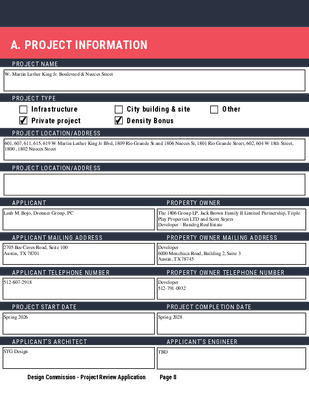
A. PROJECT INFORMATION PROJECT NAME PROJECT T YP E Infrastructure Private project PROJECT LOCATIO N/ ADDR ESS PROJECT LOCATIO N/ ADDR ESS City building & site Other Density Bonus A PPLICANT PROPE RT Y O WN ER A PPLICANT MAILI NG A DDRESS PROPE RT Y O WN ER MAI LING AD DR ESS A PPLICANT TELEP HONE N UM BE R PROPE RT Y O WN ER TEL EPHONE NUMBER PROJECT START DATE PROJECT CO MPL E TION DATE A PPLICANT’S ARCHI TE CT A PPL IC ANT’S ENGI NEER Page 8 Design Commission - Project Review Application 1. Indi cate if propo se d Pro jec t is re q u ir e d by City Ordinance to be reviewed by the Design Commiss ion . 2. D escribe the r ec omm end atio n t h at yo u a re requesting from the Desig n Com mission. 3. Current De sig n P hase o f Pro jec t ( D e s ign C o mmission prefers to see pro jec ts right aft er ap proved conceptual, sc he m atic, d esign d ev e lo pm e nt ) . 4. Is thi s Proje ct su bjec t to Site Pl an an d /o r Zonin g application ap provals? Will it b e p rese nt e d to Plann ing Commission and/o r City Co uncil? I f s o , wh en? 5. D o es t his P roj ect c om ply with L an d D ev e l opment Code Subchapter E? List specific ally an y Alternative E quiva lent Comp lianc e r equ est if any. Ple ase refer to website for Alternate Equivalent Com plia nce ( AEC) requirements. Page 9 Design Commission - Project Review Application B. PROJECT BACKGROUND 6. Prov ide proj ec t b ackgro u nd inc lu d ing go als , scope, building/planning type, and sc hedule. Broadly addre ss e ach of the “Shar ed Value s fo r Ur ban A re as ” t hat are listed on Page 6 o f the Ur ban Design Guidelines . 7. Has this proje ct c ondu cted co m mu n it y/ s t ak eholder out reach? If so, please provide do c ume ntation to d emonstrate …
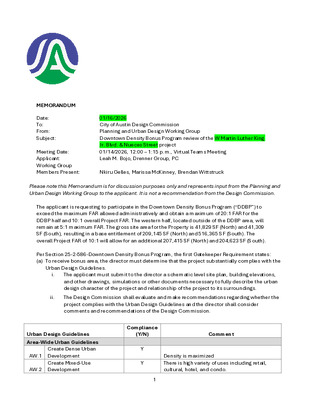
MEMORANDUM Date: To: From: Subject: Meeting Date: Applicant: Working Group Members Present: 01/16/2026 City of Austin Design Commission Planning and Urban Design Working Group Downtown Density Bonus Program review of the W Martin Luther King Jr. Blvd. & Nueces Street project 01/14/2026, 12:00 – 1:15 p.m., Virtual Teams Meeting Leah M. Bojo, Drenner Group, PC Nkiru Gelles, Marissa McKinney, Brendan Wittstruck Please note this Memorandum is for discussion purposes only and represents input from the Planning and Urban Design Working Group to the applicant. It is not a recommendation from the Design Commission. The applicant is requesting to participate in the Downtown Density Bonus Program (“DDBP”) to exceed the maximum FAR allowed administratively and obtain a maximum of 20:1 FAR for the DDBP half and 10:1 overall Project FAR. The western half, located outside of the DDBP area, will remain at 5:1 maximum FAR. The gross site area for the Property is 41,829 SF (North) and 41,309 SF (South), resulting in a base entitlement of 209,145 SF (North) and 516,365 SF (South). The overall Project FAR of 10:1 will allow for an additional 207,415 SF (North) and 204,623 SF (South). Per Section 25-2-586-Downtown Density Bonus Program, the first Gatekeeper Requirement states: (a) To receive bonus area, the director must determine that the project substantially complies with the Urban Design Guidelines. i. ii. The applicant must submit to the director a schematic level site plan, building elevations, and other drawings, simulations or other documents necessary to fully describe the urban design character of the project and relationship of the project to its surroundings. The Design Commission shall evaluate and make recommendations regarding whether the project complies with the Urban Design Guidelines and the director shall consider comments and recommendations of the Design Commission. Urban Design Guidelines Area-Wide Urban Guidelines Create Dense Urban Development Create Mixed-Use Development AW.2 AW.1 Compliance (Y/N) Comment Y Y 1 Density is maximized There is high variety of uses including retail, cultural, hotel, and condo. Limit Developments which Close Downtown Streets AW.3 Y Further Information Req. N N/A Y N/A Further Information Req. Y N/A No streets are being closed, including the alley, which is appreciated. The urban fabric to the west of this project is far less dense and much lower in height. It appears as though there is some articulation on the western side but it does look very bare in the elevations with a …
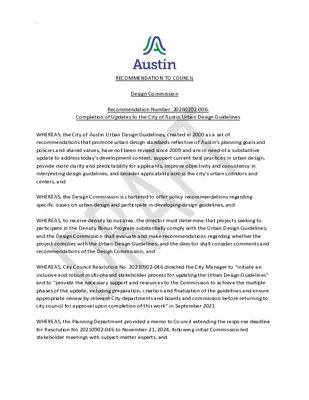
. RECOMMENDATION TO COUNCIL Design Commission Recommendation Number: 20260202-006: Completion of Updates to the City of Austin Urban Design Guidelines WHEREAS, the City of Austin Urban Design Guidelines, created in 2000 as a set of recommendations that promote urban design standards reflective of Austin’s planning goals and policies and shared values, have not been revised since 2009 and are in need of a substantive update to address today’s development context, support current best practices in urban design, provide more clarity and predictability for applicants, improve objectivity and consistency in interpreting design guidelines, and broader applicability across the city’s urban corridors and centers, and WHEREAS, the Design Commission is chartered to offer policy recommendations regarding specific issues on urban design and participate in developing design guidelines, and WHEREAS, to receive density bonus area, the director must determine that projects seeking to participate in the Density Bonus Program substantially comply with the Urban Design Guidelines; and the Design Commission shall evaluate and make recommendations regarding whether the project complies with the Urban Design Guidelines; and the director shall consider comments and recommendations of the Design Commission, and WHEREAS, City Council Resolution No. 20210902-046 directed the City Manager to “initiate an inclusive and robust multi-phased stakeholder process for updating the Urban Design Guidelines” and to “provide the necessary support and resources to the Commission to achieve the multiple phases of the update, including preparation, creation and finalization of the guidelines and ensure appropriate review by relevant City departments and boards and commission before returning to city council for approval upon completion of this work” in September 2021. WHEREAS, the Planning Department provided a memo to Council extending the response deadline for Resolution No 20210902-046 to November 21, 2024, following initial Commission-led stakeholder meetings with subject-matter experts, and . WHEREAS, the Urban Design Guidelines Working Group of the Design Commission responded to staff comments from relevant city departments and delivered a working draft of the updated guidelines to the Design Commission liaison staff in May 2025 and was not informed until December 2025 that staff had concerns over the draft language. WHEREAS, the Design Commission has requested but has not received these new written comments on the working draft of the updated guidelines from staff and thus has not had the opportunity to refine the draft to address staff comments. WHEREAS, Council Resolution No. 20210902-046 cites the needs for design recommendations for architecture, site …
Play video
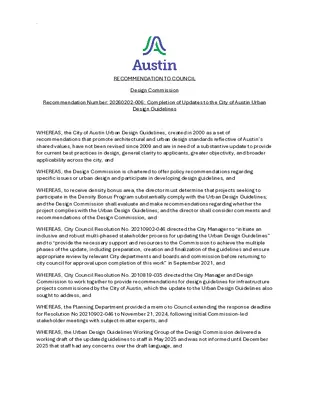
. RECOMMENDATION TO COUNCIL Design Commission Recommendation Number: 20260202-006: Completion of Updates to the City of Austin Urban Design Guidelines WHEREAS, the City of Austin Urban Design Guidelines, created in 2000 as a set of recommendations that promote architectural and urban design standards reflective of Austin’s shared values, have not been revised since 2009 and are in need of a substantive update to provide for current best practices in design, general clarity to applicants, greater objectivity, and broader applicability across the city, and WHEREAS, the Design Commission is chartered to offer policy recommendations regarding specific issues or urban design and participate in developing design guidelines, and WHEREAS, to receive density bonus area, the director must determine that projects seeking to participate in the Density Bonus Program substantially comply with the Urban Design Guidelines; and the Design Commission shall evaluate and make recommendations regarding whether the project complies with the Urban Design Guidelines; and the director shall consider comments and recommendations of the Design Commission, and WHEREAS, City Council Resolution No. 20210902-046 directed the City Manager to “initiate an inclusive and robust multi-phased stakeholder process for updating the Urban Design Guidelines” and to “provide the necessary support and resources to the Commission to achieve the multiple phases of the update, including preparation, creation and finalization of the guidelines and ensure appropriate review by relevant City departments and boards and commission before returning to city council for approval upon completion of this work” in September 2021, and WHEREAS, City Council Resolution No. 2010819-035 directed the City Manager and Design Commission to work together to provide recommendations for design guidelines for infrastructure projects commissioned by the City of Austin, which the update to the Urban Design Guidelines also sought to address, and WHEREAS, the Planning Department provided a memo to Council extending the response deadline for Resolution No 20210902-046 to November 21, 2024, following initial Commission-led stakeholder meetings with subject-matter experts, and WHEREAS, the Urban Design Guidelines Working Group of the Design Commission delivered a working draft of the updated guidelines to staff in May 2025 and was not informed until December 2025 that staff had any concerns over the draft language, and . WHEREAS, the Design Commission has not received specific written or verbal comments on the working draft of the updated guidelines from staff, and thus has not had the opportunity to refine the draft to accommodate staff comments, and WHEREAS, …
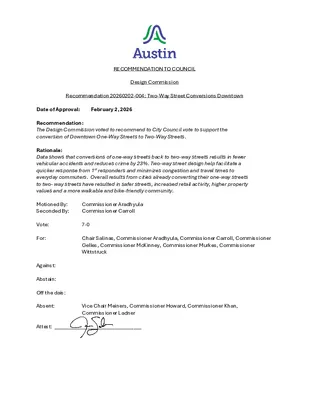
RECOMMENDATION TO COUNCIL Design Commission Recommendation 20260202-004: Two-Way Street Conversions Downtown Date of Approval: February 2, 2026 Recommendation: The Design Commission voted to recommend to City Council vote to support the conversion of Downtown One-Way Streets to Two-Way Streets. Rationale: Data shows that conversions of one-way streets back to two-way streets results in fewer vehicular accidents and reduces crime by 23%. Two-way street design help facilitate a quicker response from 1st responders and minimizes congestion and travel times to everyday commuters. Overall results from cities already converting their one-way streets to two- way streets have resulted in safer streets, increased retail activity, higher property values and a more walkable and bike-friendly community. Motioned By: Seconded By: Commissioner Aradhyula Commissioner Carroll Vote: For: Against: Abstain: Off the dais: Absent: 7-0 Chair Salinas, Commissioner Aradhyula, Commissioner Carroll, Commissioner Gelles, Commissioner McKinney, Commissioner Murkes, Commissioner Wittstruck Vice Chair Meiners, Commissioner Howard, Commissioner Khan, Commissioner Ladner Attest: __________________________________
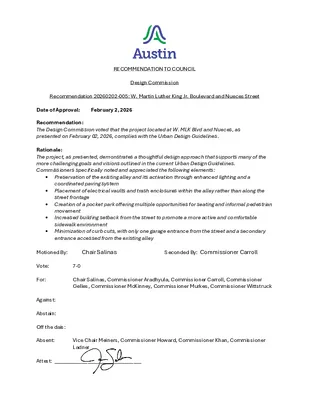
RECOMMENDATION TO COUNCIL Design Commission Recommendation 20260202-005: W. Martin Luther King Jr. Boulevard and Nueces Street Date of Approval: February 2, 2026 Recommendation: The Design Commission voted that the project located at W. MLK Blvd and Nueces, as presented on February 02, 2026, complies with the Urban Design Guidelines. Rationale: The project, as presented, demonstrates a thoughtful design approach that supports many of the more challenging goals and visions outlined in the current Urban Design Guidelines. Commissioners specifically noted and appreciated the following elements: • Preservation of the existing alley and its activation through enhanced lighting and a coordinated paving system • Placement of electrical vaults and trash enclosures within the alley rather than along the street frontage • Creation of a pocket park offering multiple opportunities for seating and informal pedestrian • movement Increased building setback from the street to promote a more active and comfortable sidewalk environment • Minimization of curb cuts, with only one garage entrance from the street and a secondary entrance accessed from the existing alley Motioned By: Chair Salinas Seconded By: Commissioner Carroll Vote: 7-0 For: Against: Abstain: Off the dais: Absent: Chair Salinas, Commissioner Aradhyula, Commissioner Carroll, Commissioner Gelles, Commissioner McKinney, Commissioner Murkes, Commissioner Wittstruck Vice Chair Meiners, Commissioner Howard, Commissioner Khan, Commissioner Ladner Attest: __________________________________
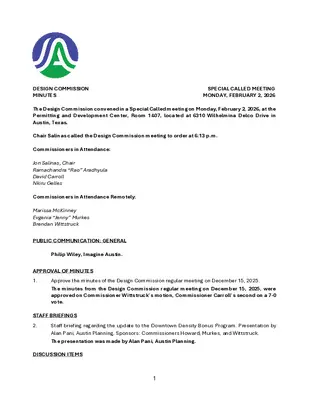
DESIGN COMMISSION MINUTES SPECIAL CALLED MEETING MONDAY, FEBRUARY 2, 2026 The Design Commission convened in a Special Called meeting on Monday, February 2, 2026, at the Permitting and Development Center, Room 1407, located at 6310 Wilhelmina Delco Drive in Austin, Texas. Chair Salinas called the Design Commission meeting to order at 6:13 p.m. Commissioners in Attendance: Jon Salinas, Chair Ramachandra “Rao” Aradhyula David Carroll Nkiru Gelles Commissioners in Attendance Remotely: Marissa McKinney Evgenia “Jenny” Murkes Brendan Wittstruck PUBLIC COMMUNICATION: GENERAL Philip Wiley, Imagine Austin. APPROVAL OF MINUTES 1. Approve the minutes of the Design Commission regular meeting on December 15, 2025. The minutes from the Design Commission regular meeting on December 15, 2025, were approved on Commissioner Wittstruck’s motion, Commissioner Carroll’s second on a 7-0 vote. STAFF BRIEFINGS 2. Staff briefing regarding the update to the Downtown Density Bonus Program. Presentation by Alan Pani, Austin Planning. Sponsors: Commissioners Howard, Murkes, and Wittstruck. The presentation was made by Alan Pani, Austin Planning. DISCUSSION ITEMS 1 3. Discussion of the Design Commission’s strategy prioritizing urban design in Density Bonus Program projects in the City of Austin. Sponsors: Commissioners Howard and Wittstruck. The motion to postpone this item to February 23, 2026, was approved on Commissioner Wittstruck’s motion, Chair Salinas’ second, on a 7-0 vote. DISCUSSION AND ACTION ITEMS 4. 5. 6. Discussion and action to recommend to City Council two-way conversions downtown. Presented by Adam Greenfield, Safe Streets. Sponsors: Commissioners Carroll and Howard. The motion to approve the recommendation to City Council to support two-way street conversions downtown was approved on Commissioner Aradhyula’s motion, Commissioner Carroll’s second, on a 7-0 vote. Discussion and action to recommend to City Council whether the project W. Martin Luther King Jr. Boulevard & Nueces Street, located at 601, 607, 611, 619 West Martin Luther King Jr Boulevard, 1809 Rio Grande Street, 1806 Nueces Street, 1801 Rio Grande Street, 604 West 18th Street and 1800 Nueces Street, complies with the Urban Design Guidelines for the City of Austin in accordance with Land Development Code § 25-2-586 (C)(1)(a)(ii). Presented by Leah Bojo, Drenner Group, PC, Justin Short, STG Design, and Chris Jackson, Fable Landscape Architecture. The motion to approve the recommendation to City Council that the project W. Martin Luther King Jr. Boulevard & Nueces Street, located at 601, 607, 611, 619 West Martin Luther King Jr Boulevard, 1809 Rio Grande Street, 1806 Nueces Street, 1801 Rio Grande …
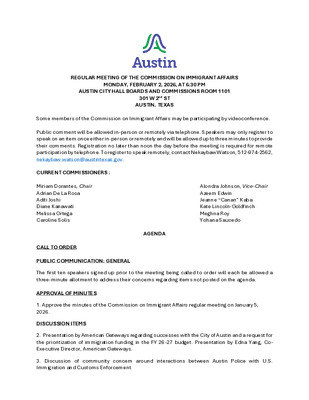
REGULAR MEETING OF THE COMMISSION ON IMMIGRANT AFFAIRS MONDAY, FEBRUARY 2, 2026, AT 6:30 PM AUSTIN CITY HALL BOARDS AND COMMISSIONS ROOM 1101 301 W 2nd ST AUSTIN, TEXAS Some members of the Commission on Immigrant Affairs may be participating by videoconference. Public comment will be allowed in-person or remotely via telephone. Speakers may only register to speak on an item once either in-person or remotely and will be allowed up to three minutes to provide their comments. Registration no later than noon the day before the meeting is required for remote participation by telephone. To register to speak remotely, contact Nekaybaw Watson, 512-974-2562, nekaybaw.watson@austintexas.gov. CURRENT COMMISSIONERS : Miriam Dorantes, Chair Adrian De La Rosa Aditi Joshi Diane Kanawati Melissa Ortega Caroline Solis AGENDA CALL TO ORDER PUBLIC COMMUNICATION: GENERAL Alondra Johnson, Vice-Chair Azeem Edwin Jeanne “Canan” Kaba Kate Lincoln-Goldfinch Meghna Roy Yohana Saucedo The first ten speakers signed up prior to the meeting being called to order will each be allowed a three-minute allotment to address their concerns regarding items not posted on the agenda. APPROVAL OF MINUTES 1. Approve the minutes of the Commission on Immigrant Affairs regular meeting on January 5, 2026. DISCUSSION ITEMS 2. Presentation by American Gateways regarding successes with the City of Austin and a request for the prioritization of immigration funding in the FY 26-27 budget. Presentation by Edna Yang, Co- Executive Director, American Gateways. 3. Discussion of community concern around interactions between Austin Police with U.S. Immigration and Customs Enforcement. WORKING GROUP UPDATES 4. Update from the Budget Working Group regarding areas of support and deadlines for the submission of budget recommendations. DISCUSSION AND ACTION ITEMS 5. Approve a list of budget priorities for each commissioner’s district. 6. Approve the Commission on Immigrant Affairs’ alternative representative for the Joint Inclusion Committee. FUTURE AGENDA ITEMS ADJOURNMENT The City of Austin is committed to compliance with the Americans with Disabilities Act. Reasonable modifications and equal access to communications will be provided upon request. For assistance, please contact the Liaison or TTY users’ route through 711. A person may request language access accommodations no later than 48 hours before the scheduled meeting. Please call or email Nekaybaw Watson at Austin City Clerk’s Office Department, at 512-974-2562 or nekaybaw.watson@austintexas.gov to request service or for additional information. For more information on the Commission on Immigrant Affairs please contact Nekaybaw Watson at 512-974-2562 or nekaybaw.watson@austintexas.gov.
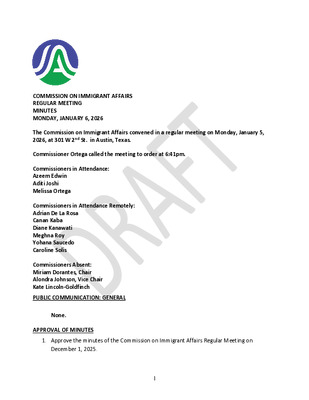
COMMISSION ON IMMIGRANT AFFAIRS REGULAR MEETING MINUTES MONDAY, JANUARY 6, 2026 The Commission on Immigrant Affairs convened in a regular meeting on Monday, January 5, 2026, at 301 W 2nd St. in Austin, Texas. Commissioner Ortega called the meeting to order at 6:41pm. Commissioners in Attendance: Azeem Edwin Aditi Joshi Melissa Ortega Commissioners in Attendance Remotely: Adrian De La Rosa Canan Kaba Diane Kanawati Meghna Roy Yohana Saucedo Caroline Solis Commissioners Absent: Miriam Dorantes, Chair Alondra Johnson, Vice Chair Kate Lincoln-Goldfinch PUBLIC COMMUNICATION: GENERAL None. APPROVAL OF MINUTES 1. Approve the minutes of the Commission on Immigrant Affairs Regular Meeting on December 1, 2025. 1 The minutes of the December 1st, 2025, regular meeting of the Commission on Immigrant Affairs was approved during the January 5th, 2026, regular meeting on Commissioner Kanawati’s motion, Commissioner Joshi’s second on a 9-0 vote. Chair Dorantes, Vice Chair Johnson, and Commissioner Lincoln-Goldfinch were absent. STAFF BRIEFINGS 2. Staff briefing regarding the upcoming programs and services for immigrant support and a recap of Welcoming Week 2025. Presentation provided by Shafina Khaki, Human Rights Officer, Austin Equity and Inclusion and Rocio Villalobos, Immigrant Affairs Manager and DACA Liaison Officer, Austin Equity and Inclusion. The presentation was made by Shafina Khaki, Human Rights Officer, Austin Equity and Inclusion and Rocio Villalobos, Immigrant Affairs Manager and DACA Liaison Officer. DISCUSSION AND ACTION ITEMS 3. Approve the Commission on Immigrant Affairs’ primary representative for the Joint Inclusion Committee. The motion to approve Commissioner Diane Kanawati as the primary representative for the Joint Inclusion Committee was approved on Commissioner Ortega’s motion, Commissioner Joshi’s second on a 9-0 vote. Chair Dorantes, Vice Chair Johnson, and Commissioner Lincoln-Goldfinch were absent. FUTURE AGENDA ITEMS Approve the appointment of an alternate representative for the Joint Inclusion Committee. Human Rights Framework Presentation including milestones, expected outcomes, and commission feedback. – Joshi, Ortega Update from the Budget Working Group, Quality of Life Study Working Group, and U-Visa T-Visa Working Group. – Ortega, Joshi ADJOURNMENT The meeting was adjourned without objection at 7:26p.m. on Commissioner Ortega’s motion. 2
Play audio
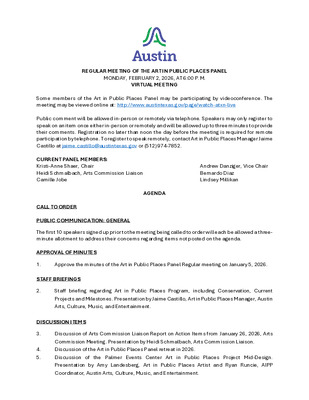
REGULAR MEETING OF THE ART IN PUBLIC PLACES PANEL MONDAY, FEBRUARY 2, 2026, AT 6:00 P.M. VIRTUAL MEETING Some members of the Art in Public Places Panel may be participating by videoconference. The meeting may be viewed online at: http://www.austintexas.gov/page/watch-atxn-live Public comment will be allowed in-person or remotely via telephone. Speakers may only register to speak on an item once either in-person or remotely and will be allowed up to three minutes to provide their comments. Registration no later than noon the day before the meeting is required for remote participation by telephone. To register to speak remotely, contact Art in Public Places Manager Jaime Castillo at jaime.castillo@austintexas.gov or (512) 974-7852. CURRENT PANEL MEMBERS: Kristi-Anne Shaer, Chair Heidi Schmalbach, Arts Commission Liaison Camille Jobe Andrew Danziger, Vice Chair Bernardo Diaz Lindsey Millikan AGENDA CALL TO ORDER PUBLIC COMMUNICATION: GENERAL The first 10 speakers signed up prior to the meeting being called to order will each be allowed a three- minute allotment to address their concerns regarding items not posted on the agenda. APPROVAL OF MINUTES 1. Approve the minutes of the Art in Public Places Panel Regular meeting on January 5, 2026. STAFF BRIEFINGS 2. Staff briefing regarding Art in Public Places Program, including Conservation, Current Projects and Milestones. Presentation by Jaime Castillo, Art in Public Places Manager, Austin Arts, Culture, Music, and Entertainment. DISCUSSION ITEMS 3. 4. 5. Discussion of Arts Commission Liaison Report on Action Items from January 26, 2026, Arts Commission Meeting. Presentation by Heidi Schmalbach, Arts Commission Liaison. Discussion of the Art in Public Places Panel retreat in 2026. Discussion of the Palmer Events Center Art in Public Places Project Mid-Design. Presentation by Amy Landesberg, Art in Public Places Artist and Ryan Runcie, AIPP Coordinator, Austin Arts, Culture, Music, and Entertainment. DISCUSSION AND ACTION ITEMS 6. 7. Approve a recommendation to the Arts Commission for the NESC Garage Façade Art in Public Places Project Artist Selection. Presentation by Rebecca Rende, AIPP Coordinator Senior, Austin Arts, Culture, Music, and Entertainment. Approve a recommendation to the Arts Commission for the 2026-2028 Art in Public Places Pre-Qualified Texas Public Artist Pool Request for Qualifications. Presentation by Rebecca Rende, AIPP Coordinator Senior, Austin Arts, Culture, Music, and Entertainment. FUTURE AGENDA ITEMS ADJOURNMENT The City of Austin is committed to compliance with the Americans with Disabilities Act. Reasonable modifications and equal access to communications will be provided upon request. For assistance, …
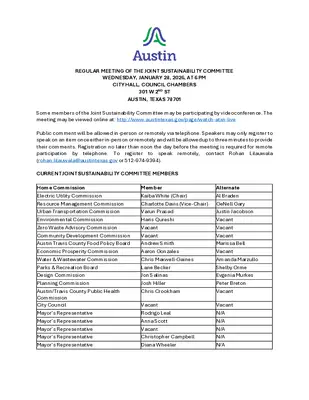
REGULAR MEETING OF THE JOINT SUSTAINABILITY COMMITTEE WEDNESDAY, JANUARY 28, 2026, AT 6 PM CITY HALL, COUNCIL CHAMBERS 301 W 2ND ST AUSTIN, TEXAS 78701 Some members of the Joint Sustainability Committee may be participating by videoconference. The meeting may be viewed online at: http://www.austintexas.gov/page/watch-atxn-live Public comment will be allowed in-person or remotely via telephone. Speakers may only register to speak on an item once either in-person or remotely and will be allowed up to three minutes to provide their comments. Registration no later than noon the day before the meeting is required for remote participation by remotely, contact Rohan Lilauwala telephone. To (rohan.lilauwala@austintexas.gov or 512-974-9394). to speak register CURRENT JOINT SUSTAINABILITY COMMITTEE MEMBERS Home Commission Electric Utility Commission Resource Management Commission Urban Transportation Commission Environmental Commission Zero Waste Advisory Commission Community Development Commission Austin Travis County Food Policy Board Economic Prosperity Commission Water & Wastewater Commission Parks & Recreation Board Design Commission Planning Commission Austin/Travis County Public Health Commission City Council Mayor’s Representative Mayor’s Representative Mayor’s Representative Mayor’s Representative Mayor’s Representative Alternate Al Braden Member Kaiba White (Chair) Charlotte Davis (Vice-Chair) GeNell Gary Varun Prasad Haris Qureshi Vacant Vacant Andrew Smith Aaron Gonzales Chris Maxwell-Gaines Lane Becker Jon Salinas Josh Hiller Chris Crookham Justin Jacobson Vacant Vacant Vacant Marissa Bell Vacant Amanda Marzullo Shelby Orme Evgenia Murkes Peter Breton Vacant Vacant Rodrigo Leal Anna Scott Vacant Christopher Campbell Diana Wheeler Vacant N/A N/A N/A N/A N/A AGENDA CALL TO ORDER PUBLIC COMMUNICATION: GENERAL The first 10 speakers signed up prior to the meeting being called to order will each be allowed a three- minute allotment to address their concerns regarding items not posted on the agenda. APPROVAL OF MINUTES 1. Approve the minutes of the Joint Sustainability Committee Regular Meeting on November 19, 2025. STAFF BRIEFINGS 2. Staff briefing on Carbon Offsets. Presentation by Phillip Duran, Austin Climate Action and Resilience. DISCUSSION AND ACTION ITEMS 3. 4. 5. 6. Approve the creation of working groups for FY27 City of Austin Budget, funding, and priority policy recommendations. Approve a recommendation related to climate and sustainability in the FY26 City of Austin Budget. Approve a recommendation related to climate and sustainability in the 2026 bond. Approve a recommendation related to Leak Detection and Repair in the Texas Gas Service Franchise Agreement. DISCUSSION ITEMS 7. Update regarding the Texas Gas Service Franchise Agreement – Charlotte Davis, Resource Management Commission. FUTURE AGENDA ITEMS …
Play video
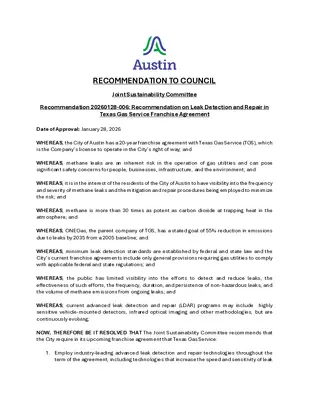
RECOMMENDATION TO COUNCIL Joint Sustainability Committee Recommendation 20260128-006: Recommendation on Leak Detection and Repair in Texas Gas Service Franchise Agreement Date of Approval: January 28, 2026 WHEREAS, the City of Austin has a 20-year franchise agreement with Texas Gas Service (TGS), which is the Company’s license to operate in the City’s right of way; and WHEREAS, methane leaks are an inherent risk in the operation of gas utilities and can pose significant safety concerns for people, businesses, infrastructure, and the environment; and WHEREAS, it is in the interest of the residents of the City of Austin to have visibility into the frequency and severity of methane leaks and the mitigation and repair procedures being employed to minimize the risk; and WHEREAS, methane is more than 30 times as potent as carbon dioxide at trapping heat in the atmosphere; and WHEREAS, ONEGas, the parent company of TGS, has a stated goal of 55% reduction in emissions due to leaks by 2035 from a 2005 baseline; and WHEREAS, minimum leak detection standards are established by federal and state law and the City’s current franchise agreements include only general provisions requiring gas utilities to comply with applicable federal and state regulations; and WHEREAS, the public has limited visibility into the efforts to detect and reduce leaks, the effectiveness of such efforts, the frequency, duration, and persistence of non-hazardous leaks, and the volume of methane emissions from ongoing leaks; and WHEREAS, current advanced leak detection and repair (LDAR) programs may include highly sensitive vehicle-mounted detectors, infrared optical imaging and other methodologies, but are continuously evolving; NOW, THEREFORE BE IT RESOLVED THAT The Joint Sustainability Committee recommends that the City require in its upcoming franchise agreement that Texas Gas Service: 1. Employ industry-leading advanced leak detection and repair technologies throughout the term of the agreement, including technologies that increase the speed and sensitivity of leak detection, expand the search footprint, reduce response time for gas emergencies, and/or increase the repair speed of leaks within the Austin Metropolitan area, 2. Regularly update its LDAR practices to reflect technological advancements, 3. Submit annual reports to the City on the performance of its LDAR programs within the Austin Metropolitan area. Information in reports could include but is not limited to: • LDAR practices & technology employed including leak detection survey frequency and mitigation strategies • Fugitive methane emissions and fugitive methane emissions rate • Average response time for …
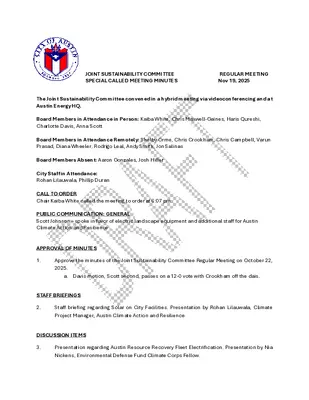
JOINT SUSTAINABILITY COMMITTEE REGULAR MEETING SPECIAL CALLED MEETING MINUTES Nov 19, 2025 The Joint Sustainability Committee convened in a hybrid meeting via videoconferencing and at Austin Energy HQ. Board Members in Attendance in Person: Kaiba White, Chris Maxwell-Gaines, Haris Qureshi, Charlotte Davis, Anna Scott Board Members in Attendance Remotely: Shelby Orme, Chris Crookham, Chris Campbell, Varun Prasad, Diana Wheeler, Rodrigo Leal, Andy Smith, Jon Salinas Board Members Absent: Aaron Gonzales, Josh Hiller City Staff in Attendance: Rohan Lilauwala, Phillip Duran CALL TO ORDER Chair Kaiba White called the meeting to order at 6:07 pm. PUBLIC COMMUNICATION: GENERAL Scott Johnson – spoke in favor of electric landscape equipment and additional staff for Austin Climate Action and Resilience APPROVAL OF MINUTES 1. Approve the minutes of the Joint Sustainability Committee Regular Meeting on October 22, 2025. a. Davis motion, Scott second, passes on a 12-0 vote with Crookham off the dais. STAFF BRIEFINGS 2. Staff briefing regarding Solar on City Facilities. Presentation by Rohan Lilauwala, Climate Project Manager, Austin Climate Action and Resilience. DISCUSSION ITEMS 3. Presentation regarding Austin Resource Recovery Fleet Electrification. Presentation by Nia Nickens, Environmental Defense Fund Climate Corps Fellow. a. Scott: questions around equity, how to measure benefits. Potential for further study. b. Crookham: could they be used as backup power? Nickens: potentially, done in other places. c. Campbell: is future energy mix factored into GHG calculations? Nickens: current makeup, future greening would improve GHG reductions. d. Campbell: was cost of charging at different times considered? Nickens: no, potential future analysis. e. Salinas: how long were vehicles replaced in 2026 in operation for? What is life cycle? Nickens: unknown, will follow back up. f. Salinas: is anyone else doing this? Nickens: a couple of trucks, not large scale g. White: how many vehicles can a daisy chain charge? Nickens: unknown, new proprietary technology h. Scott: what’s the scale of program to be cost saving? Nickens: in current scenario, by 2032, break even, future savings after. i. Campbell: what’s the biggest barrier? Nickens: cost. 4. 5. Presentation regarding Commercial Landscape Survey. Presentation by Jen Cregar, Terra Lumina Consulting. a. Smith: affirms phased rollout, Presentation regarding Farmland Acquisition and Preservation. Presentation by Andy Smith, Marissa Bell, and Matt Simon, Austin-Travis County Food Policy Board. DISCUSSION AND ACTION ITEMS 6. Approve the creation of working groups for FY27 City of Austin Budget, funding, and priority policy recommendations. a. White motion, Davis …
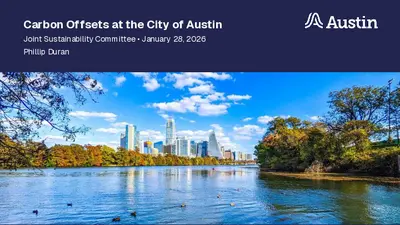
Carbon Offsets at the City of Austin Joint Sustainability Committee • January 28, 2026 Phillip Duran Agenda 01 What are carbon offsets? 02 Carbon offsets at the City of Austin 03 How and why we use them 04 Next steps and opportunities 2 A refresher - What are carbon offsets? • Voluntary carbon market • One carbon offset → one tonne of carbon avoided or captured elsewhere • If done correctly, supports good projects that might not otherwise happen • Registries and standards verify when it’s “done correctly” E.g. Green-E, American Carbon Registry, Verra, Gold Standard, Intergrity Council of the Voluntary Carbon Market, more 3 Types of Carbon Offsets Technology based solutions Renewables, energy efficiency, methane or even direct air carbon capture Nature based solutions Tree planting, land management and improvement, sustainable agriculture and soil carbon 4 Types of Carbon Offsets Old or low quality ~$1 per tonne Old offsets, before standards and verification Quality and value $15-$30, up to $100 per tonne Established tech or nature solutions - Austin participates here Emerging technology $1,000 per tonne Direct air capture. Might make sense for high profile buyers 5 Carbon Offsets at the City of Austin History and our approach 6 What’s in the Climate Equity Plan Reduce carbon emissions FIRST For emissions that are difficult to reduce, prioritize offsets that are: 1. From projects as close to the Austin area as possible. 2. From projects that create additional environmental and equity benefits. 3. Carbon offsets from negative emissions should be prioritized over avoided emissions. 7 Our Motivation Net-zero by 2040 – Climate Equity Plan 2007 Resolution to make City operations carbon neutral by 2020 In pursuit of both goals, we urge all City projects to attain high levels of sustainability certification (LEED, AEGB, SITES, Envision, etc) • Better projects • Higher engagement in climate and resilience efforts • Means we’re integrating and operationalizing sustainability as much as possible Sometimes carbon offsets are part of the certification and accreditation process. 8 Examples of Carbon Offset Purchases Austin Energy HQ LEED Platinum Facility Green-E Certified offsets for 5 years of operations Austin Airport (AUS) Airport Carbon Accreditation Green-E Certified offsets or better Austin Convention Center LEED Facilities Participates with other buyers to maximize purchasing power Climate Action & Resilience Support parterns in pursuit of climate goals City Forrest Credits in collaboration with TreeFolks 9 Opportunities and Next Steps 1 0 Promote sustainable …
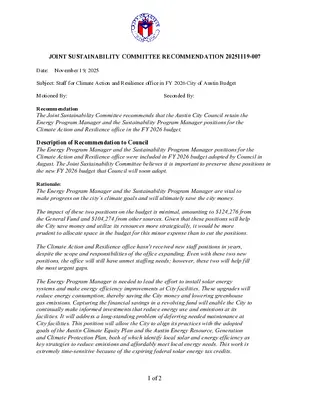
JOINT SUSTAINABILITY COMMITTEE RECOMMENDATION 20251119-007 Date: November 19, 2025 Subject: Staff for Climate Action and Resilience office in FY 2026 City of Austin Budget Motioned By: Seconded By: Recommendation The Joint Sustainability Committee recommends that the Austin City Council retain the Energy Program Manager and the Sustainability Program Manager positions for the Climate Action and Resilience office in the FY 2026 budget. Description of Recommendation to Council The Energy Program Manager and the Sustainability Program Manager positions for the Climate Action and Resilience office were included in FY 2026 budget adopted by Council in August. The Joint Sustainability Committee believes it is important to preserve these positions in the new FY 2026 budget that Council will soon adopt. Rationale: The Energy Program Manager and the Sustainability Program Manager are vital to make progress on the city’s climate goals and will ultimately save the city money. The impact of these two positions on the budget is minimal, amounting to $124,276 from the General Fund and $104,274 from other sources. Given that these positions will help the City save money and utilize its resources more strategically, it would be more prudent to allocate space in the budget for this minor expense than to cut the positions. The Climate Action and Resilience office hasn't received new staff positions in years, despite the scope and responsibilities of the office expanding. Even with these two new positions, the office will still have unmet staffing needs; however, these two will help fill the most urgent gaps. The Energy Program Manager is needed to lead the effort to install solar energy systems and make energy efficiency improvements at City facilities. These upgrades will reduce energy consumption, thereby saving the City money and lowering greenhouse gas emissions. Capturing the financial savings in a revolving fund will enable the City to continually make informed investments that reduce energy use and emissions at its facilities. It will address a long-standing problem of deferring needed maintenance at City facilities. This position will allow the City to align its practices with the adopted goals of the Austin Climate Equity Plan and the Austin Energy Resource, Generation and Climate Protection Plan, both of which identify local solar and energy efficiency as key strategies to reduce emissions and affordably meet local energy needs. This work is extremely time-sensitive because of the expiring federal solar energy tax credits. 1 of 2 The Sustainable Program Manager …
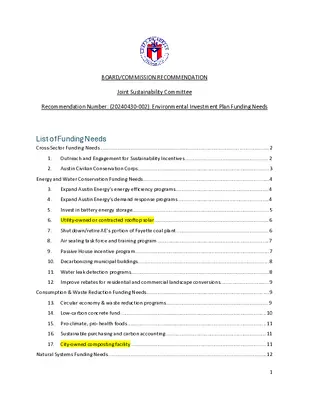
BOARD/COMMISSION RECOMMENDATION Joint Sustainability Committee Recommendation Number: (20240430-002): Environmental Investment Plan Funding Needs List of Funding Needs Cross-Sector Funding Needs ......................................................................................................................... 2 1. 2. Outreach and Engagement for Sustainability Incentives ............................................................ 2 Austin Civilian Conservation Corps .............................................................................................. 3 Energy and Water Conservation Funding Needs .......................................................................................... 4 3. 4. 5. 6. 7. 8. 9. Expand Austin Energy’s energy efficiency programs ................................................................... 4 Expand Austin Energy’s demand response programs ................................................................. 4 Invest in battery energy storage.................................................................................................. 5 Utility-owned or contracted rooftop solar .................................................................................. 6 Shut down/retire AE’s portion of Fayette coal plant .................................................................. 6 Air sealing task force and training program ................................................................................ 7 Passive House incentive program ................................................................................................ 7 10. Decarbonizing municipal buildings .............................................................................................. 8 11. Water leak detection programs ................................................................................................... 8 12. Improve rebates for residential and commercial landscape conversions ................................... 9 Consumption & Waste Reduction Funding Needs........................................................................................ 9 13. Circular economy & waste reduction programs .......................................................................... 9 14. Low-carbon concrete fund ........................................................................................................ 10 15. Pro-climate, pro-health foods ................................................................................................... 11 16. Sustainable purchasing and carbon accounting ........................................................................ 11 17. City-owned composting facility ................................................................................................. 11 Natural Systems Funding Needs ................................................................................................................. 12 1 18. Preservation of existing agricultural land .................................................................................. 12 19. Revolving loan fund for Working Farms Fund pilot ................................................................... 12 20. Energy and water dashboard for city facilities .......................................................................... 13 21. Comprehensive public tree inventory for the city of Austin ..................................................... 13 Transportation and Land Use Funding Needs ............................................................................................. 14 22. Austin Resource Recovery Fleet Electrification ......................................................................... 14 23. Austin Resource Recovery Transfer Station .............................................................................. 14 24. Expand All Ages and Abilities Bicycle Network, Urban Trails, Sidewalks, and Shared Mobility 14 25. Extend Pickup Service Zones ..................................................................................................... 16 26. Downtown High-Frequency Circulator ...................................................................................... 17 27. Neighborhood E-Circulators ...................................................................................................... 18 28. Heat Resilience Infrastructure ................................................................................................... 19 29. CityLeap ATX Plan: convert travel lanes on arterial roads to protected bike or bus lanes ....... 21 30. Establish a city-owned all-electric carshare service .................................................................. 21 31. Low-cost, accessible charging stations at City of Austin owned facilities ................................. 22 32. Install charging stations at multi-family homes with priority in low and moderate income communities ....................................................................................................................................... 23 33. E-mobility solutions pilot program ............................................................................................ 24 Cross-Sector Funding Needs 1. Outreach and Engagement for Sustainability Incentives Details: The City of Austin has numerous sustainability incentive programs aligned with the goals of the Climate Equity Plan. However, many of these programs are underutilized, especially among low-income households. A part of the challenge is awareness. The city should host a …
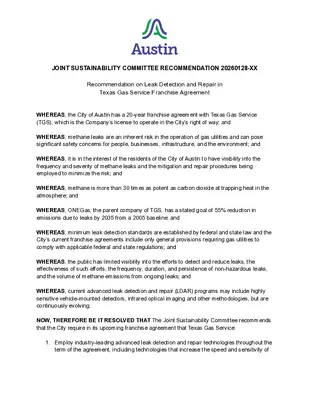
JOINT SUSTAINABILITY COMMITTEE RECOMMENDATION 20260128-XX Recommendation on Leak Detection and Repair in Texas Gas Service Franchise Agreement WHEREAS, the City of Austin has a 20-year franchise agreement with Texas Gas Service (TGS), which is the Company’s license to operate in the City’s right of way; and WHEREAS, methane leaks are an inherent risk in the operation of gas utilities and can pose significant safety concerns for people, businesses, infrastructure, and the environment; and WHEREAS, it is in the interest of the residents of the City of Austin to have visibility into the frequency and severity of methane leaks and the mitigation and repair procedures being employed to minimize the risk; and WHEREAS, methane is more than 30 times as potent as carbon dioxide at trapping heat in the atmosphere; and WHEREAS, ONEGas, the parent company of TGS, has a stated goal of 55% reduction in emissions due to leaks by 2035 from a 2005 baseline; and WHEREAS, minimum leak detection standards are established by federal and state law and the City’s current franchise agreements include only general provisions requiring gas utilities to comply with applicable federal and state regulations; and WHEREAS, the public has limited visibility into the efforts to detect and reduce leaks, the effectiveness of such efforts, the frequency, duration, and persistence of non-hazardous leaks, and the volume of methane emissions from ongoing leaks; and WHEREAS, current advanced leak detection and repair (LDAR) programs may include highly sensitive vehicle-mounted detectors, infrared optical imaging and other methodologies, but are continuously evolving; NOW, THEREFORE BE IT RESOLVED THAT The Joint Sustainability Committee recommends that the City require in its upcoming franchise agreement that Texas Gas Service: 1. Employ industry-leading advanced leak detection and repair technologies throughout the term of the agreement, including technologies that increase the speed and sensitivity of leak detection, expand the search footprint, reduce response time for gas emergencies, and/or increase the repair speed of leaks within the City, 2. Regularly update its LDAR practices to reflect technological advancements, 3. Submit annual reports to the City on the performance of its LDAR programs within the City. Information in reports could include but is not limited to: ○ LDAR practices & technology employed including leak detection survey frequency and mitigation strategies ○ Fugitive methane emissions and fugitive methane emissions rate ○ Average response time for gas emergencies ○ Average repair time
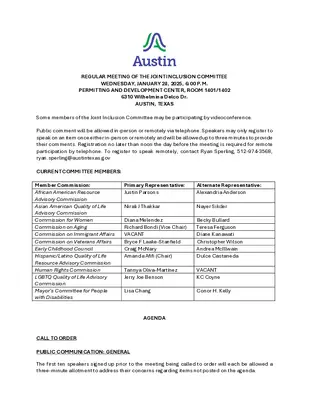
REGULAR MEETING OF THE JOINT INCLUSION COMMITTEE WEDNESDAY, JANUARY 28, 2025, 6:00 P.M. PERMITTING AND DEVELOPMENT CENTER, ROOM 1401/1402 6310 Wilhelmina Delco Dr. AUSTIN, TEXAS Some members of the Joint Inclusion Committee may be participating by videoconference. Public comment will be allowed in-person or remotely via telephone. Speakers may only register to speak on an item once either in-person or remotely and will be allowed up to three minutes to provide their comments. Registration no later than noon the day before the meeting is required for remote participation by telephone. To register to speak remotely, contact Ryan Sperling, 512-974-3568, ryan.sperling@austintexas.gov CURRENT COMMITTEE MEMBERS: Member Commission: African American Resource Advisory Commission Asian American Quality of Life Advisory Commission Commission for Women Commission on Aging Commission on Immigrant Affairs Commission on Veterans Affairs Early Childhood Council Hispanic/Latino Quality of Life Resource Advisory Commission Human Rights Commission LGBTQ Quality of Life Advisory Commission Mayor’s Committee for People with Disabilities Primary Representative: Justin Parsons Alternate Representative: Alexandria Anderson Nirali J Thakkar Nayer Sikder Diana Melendez Richard Bondi (Vice Chair) VACANT Bryce F Laake-Stanfield Craig McNary Amanda Afifi (Chair) Becky Bullard Teresa Ferguson Diane Kanawati Christopher Wilson Andrea McIllwain Dulce Castaneda Tannya Oliva-Martínez Jerry Joe Benson VACANT KC Coyne Lisa Chang Conor H. Kelly AGENDA CALL TO ORDER PUBLIC COMMUNICATION: GENERAL The first ten speakers signed up prior to the meeting being called to order will each be allowed a three-minute allotment to address their concerns regarding items not posted on the agenda. APPROVAL OF MINUTES 1. Approve the minutes of the Joint Inclusion Committee regular meeting on December 3. 2025. DISCUSSION ITEMS 2. 3. 4. 5. 6. Presentation providing an update on American Gateways’ successes and requesting prioritization of immigration funds in next year’s budget. Presentation by Rebecca Lightsey, Co-Executive Director, American Gateways. Discussion regarding feedback on the January 21st Budget Town Hall. Discussion regarding the timeline of the City’s budget process and impacts to commission recommendations. Discussion regarding the changes in the structure of Austin Equity & Inclusion over the last year. Discussion regarding Austin Police Department and protest response. DISCUSSION AND ACTION ITEMS 7. 8. Approve changes to working group membership. Approve amendments to the JIC 2026 Annual Meeting Schedule. WORKING GROUP UPDATES 9. 10. Report from the Budget Follow-up Working Group regarding City response and implementation of commission recommendations. Update from the FY2026-27 Budget Working Group regarding collaboration on home commission …
Play audio
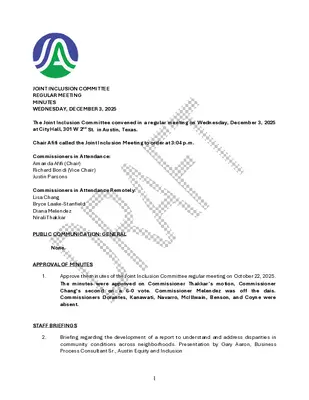
JOINT INCLUSION COMMITTEE REGULAR MEETING MINUTES WEDNESDAY, DECEMBER 3, 2025 The Joint Inclusion Committee convened in a regular meeting on Wednesday, December 3, 2025 at City Hall, 301 W 2nd St. in Austin, Texas. Chair Afifi called the Joint Inclusion Meeting to order at 3:04 p.m. Commissioners in Attendance: Amanda Afifi (Chair) Richard Bondi (Vice Chair) Justin Parsons Commissioners in Attendance Remotely: Lisa Chang Bryce Laake-Stanfield Diana Melendez Nirali Thakkar PUBLIC COMMUNICATION: GENERAL None. APPROVAL OF MINUTES 1. Approve the minutes of the Joint Inclusion Committee regular meeting on October 22, 2025. The minutes were approved on Commissioner Thakkar’s motion, Commissioner Chang’s second on a 6-0 vote. Commissioner Melendez was off the dais. Commissioners Dorantes, Kanawati, Navarro, McIllwain, Benson, and Coyne were absent. STAFF BRIEFINGS 2. Briefing regarding the development of a report to understand and address disparities in community conditions across neighborhoods. Presentation by Gary Aaron, Business Process Consultant Sr., Austin Equity and Inclusion 1 The presentation was made by Gary Aaron, Business Process Consultant Sr., and Shivani Datar, Business Process Specialist, Austin Equity & Inclusion. DISCUSSION ITEMS 3. Update on the results of Get to Know Your Commissioners events. Update by Chair Afifi. DISCUSSION AND ACTION ITEMS 4. 5. Approve bylaw amendments to add a Secretary officer role. The motion to approve a bylaw amendment to add a Secretary officer role was approved on Commissioner Laake-Stanfield’s motion, Commissioner Parsons’ second on a 6-1 vote. Commissioner Chang voted nay. Commissioners Dorantes, Kanawati, Navarro, McIllwain, Benson, and Coyne were absent. Approve changes to working group membership. Without objection, Chair Bondi stepped off the Digital Access Working Group, Future Commission Working Group, and Texas Legislative Working Group; Commissioner Chang joined the Digital Access Working Group and Independent Equity Office and Human Rights Office Working Group; Commissioner Parsons joined the Future Commission Working Group; and Commissioner Laake-Stanfield joined the Emergency Preparedness Working Group. WORKING GROUP UPDATES 6. Update from the FY2026-27 Budget Recommendations Working Group regarding its most recent working group meeting and progress on the working group goals. Update by Vice Chair Bondi. FUTURE AGENDA ITEMS Create working group to encourage collaboration between recommendations between home commissions. –Vice Chair Bondi Create new working group for collaboration between mayor’s committee, commission on aging, and commission on veterans’ affairs. –Commissioner Laake Stanfield. Discussion on the changes of the structure of the Equity Office over the last year. –Commissioner Chang. ADJOURNMENT Chair Afifi adjourned …